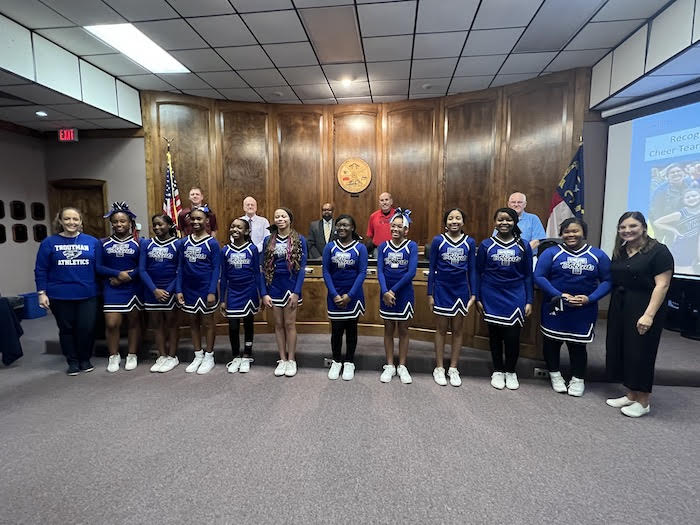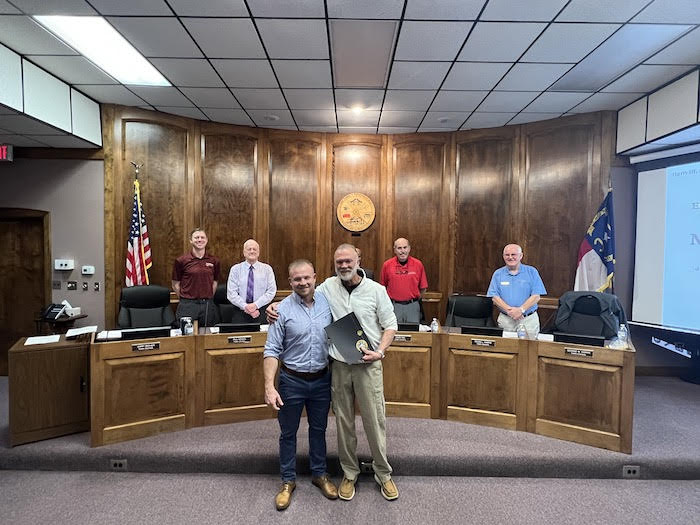
BY DEBBIE PAGE
The Troutman Town Council unanimously approved the proposed Shinn Farms development on Thursday night. The project’s property, located next to town limits, was approved for annexation and rezoned to mixed residential to accommodate developers’ plans for the site.
Construction will commence in 2024, with completion scheduled in the 2030-31 time frame.
The 276-acre development, reduced from the initially planned 629 homes to 598, will have three areas: growing families, age-targeted 55 & over, and a more affordable new families section. Town Planner Lynne Hair said the development had a 2.14 density units per acre with nearly 19 acres of open space (49 percent of property).
The developers have offered to donate 3/4 of an acre with road frontage as a town recreation area if the town desires.
The traffic impact study is complete, and the developers agreed as part of the conditions to follow all TIA requirements. The initial plan was to donate $150,000 toward the Houston Road/Flower House Loop realignment scheduled for 2024, but since NCDOT said the project was already fully funded, they are asking the developers to instead improve other area intersections at a higher cost.
The developer also agreed to start road improvements when the 100th Certificate of Occupancy is issued rather than the proposed 150th, at the request of Mayor Pro Tem Paul Henkel.
Hair recommended approval of the project since it met the Future Land Use Map density of two to three units per acre for that area, located at Weathers Creek and Houston Road. She noted that UDO safeguards and the long list of agreed upon conditions will ensure quality development on the site.
Paul Pennell of Urban Design Partners detailed the extensive amenities planned for each section, including a playground, passive sports fields, walking paths, green space with seating areas, and a rock skipping pond in the new families area.
In the growing families section, proposed amenities include a community pool, playground, community green, amphitheater, pickleball courts, disc golf, fire pits, dog washing station, food truck parking pads, greenway trails, electric vehicle charging stations, and community package lockers.
The over 55 age-targeted amenities could include a community garden, walking trail with fitness station, programmed green space (with possible wine park, fire pit, rocking chair patios, and butterfly garden), and an arboretum.
The distinct neighborhoods will share amenities and are connected through mulched and concrete trails and sidewalks to promote walkability, biking, and golf carts. The development will have streetscape trees as well as two trees per lot.
In the rezoning public hearing, Sanders Ridge resident Richard Perona expressed concerns about the increased traffic on the narrow, curvy Houston Road and the Weathers Creek bridge issues. He also wanted no connectivity between Sanders Ridge and Shinn Farms and disliked the disparity in lot size between the two neighborhoods.
Hair explained that neighborhood connectivity is planned and required by town ordinances to improve traffic flow and to provide traffic alternatives in the event of accidents or road closures.
TAX COMPLAINTS
During public comment, Jim McNiff decried the 25 to 50 percent property value increases many property owners received in the mail this past week and encouraged people to appeal to the county.
To offset this county tax increase, McNiff appealed to the council to reduce the 52-cent per $100 town tax, raised five cents in 2016 to rebuild the town’s fund balance savings, which had then slipped close to the 8 percent amount required by state law.
McNiff said the town’s 2021-2022 audit show the fund balance stands at $4.3 million, or 77 percent of the town’s annual budget, more than nine times the percentage required by the state. He also reminded the council that members at the time said they would roll back the tax rate after the fund balance was restored.
Though he has questioned the failure to lower the town tax rate every year, McNiff said his pleas have been ignored. He understood the need for a “rainy day” fund but asserted that residents need rainy day funds as well for unexpected expenses.
“You are taking money out of the pockets of taxpayers to the town’s. It’s not fair; it’s not right.”
“I’m asking you to think about citizens dealing with reassessment and inflation. Do the right thing here. It’s time to do it!”
Thom McGraw said the property value increase will create a significant windfall for the town, so it’s right to lower the town tax rate.
In their comments, all council members expressed a desire to look at the tax rate during the upcoming 2023-2024 budget talks. Henkel said his property value had doubled as well, so he understood the citizens’ concerns.
However, Henkel noted the town “does not collect money for the fun of it.” He said the growing town has future infrastructure needs that the council and town are preparing for because “we have a big rainy day coming.”
Though developers put in infrastructure in the neighborhoods they build, the town has to run water and sewer lines to connect to them. They also are in the process of upgrading pump stations and have much road and line infrastructure to maintain, as well as adding employees to the police, recreation, and other departments as needs for town services increases.
The town also constantly seeks grant money to help reduce costs to taxpayers, but inflation is also hitting the town as well.
“It’s vital we have the funds to cover our needs,” said Henkel. “The fund balance could be eaten up with just one large project. I have heard that to meet all upcoming anticipated needs may cost $15 to $16 million in the coming years.”
Town Finance Director Justin Mundy agreed, saying they would look at the tax rate in upcoming budget discussions but that the town has many needs.
“We have addressed a few, but growth will only increase the needs,” he said. “We are blessed to provides the services we do with such a small staff. We have to be efficient and always work to be even more efficient.”
Town Manager Ron Wyatt pointed out the town also has space needs, with a new town hall necessary soon to house the increasing staff members that serve citizens, with the current town hall becoming the Troutman Police Department.
As a taxpayer himself, Wyatt said he understands the frustration with higher taxes; however, Troutman’s overall costs are the equivalent or cheaper than surrounding towns.
The mayor also pointed out the town has not raised taxes in seven years and had not raised taxes for quite a few years prior to that 2016 increase.
RECOGNITIONS

Mayor Teross Young and the council recognized the Iredell County Cheer Classic Champion Troutman Middle School Bobcats Cheerleading Team: Shakirah Chambers, Taliah Dulin, Malia Forte, Faith Geter, Jade Ikard, Shamya Lyons, Sania McConnaughey, Ashy’A Robinson, Kaliah Shuford, and Zoe Wood. The team is coached by Amber Reep and Alexis Johnson.

They also honored January Town of Troutman Employee of the Month Mark Jewett, who was described by Public Works Director Adam Lippard as an outstanding employee who daily exceeds expectations and takes on demanding projects that he completes with efficiency and enthusiasm. Lippard said Jewett also takes ownership of his duties, watching training videos on his own time to learn new skills and improve his equipment operation knowledge.
Mayor Young commented that having such enthusiastic employees who put in extra effort are great for the town and its citizens.
OTHER BUSINESS
In other business, the council:
♦ Approved Budget Amendments for the Building Reuse Grant expenditure to CR Onsrud of $125,000 (state grant money being transferred with the town as the conduit) and for adding $16,241 in proceeds from the sale of a police trailer and police department activities.
♦ Approved American Rescue Plan (ARP) Act Of 2021: Coronavirus State And Local Fiscal Recovery Funds Ordinance for spending the $822,473 Troutman was awarded, half of which was received last year and the rest this year. The funds, now sitting in an ARP account, will be used to reimburse town salaries from July 1 – December 30, 2021, thus moving the money into a different “pot” that the town can then use on infrastructure or other projects as it desires.
♦ Approved a Noise Ordinance amendment adding language that provides for the ability to regulate and measure noise disturbances.



